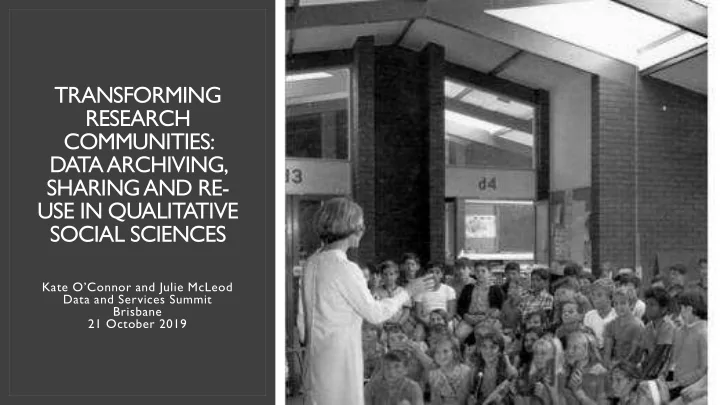

TRANSFORMING RESEARCH COMMUNITIES: DATA ARCHIVING, SHARING AND RE- USE IN QUALITATIVE SOCIAL SCIENCES Kate O’Connor and Julie McLeod Data and Services Summit Brisbane 21 October 2019
Project outline ◦ Development of a new SOCEY website published at socey.hasscloud.net.au providing links to a new SOCEY repository housed by the Australian Data Archive ◦ Archiving of six research projects in the SOCEY repository ◦ Development of report on best practice in archiving and sharing qualitative data available at https://socey.hasscloud.net.au/repository/discussion-paper/ ◦ Workshop asking policy and community sector representatives to engage with the new website and discuss how it could be better structured and formatted to meet their needs held on 20 September.
Key Issues ◦ Limited engagement with data archiving and sharing questions within the field and concerns about methodological and ethical issues raised by data archiving and sharing ◦ Anonymisation/de-identification of qualitative data time-consuming and not straightforward. Complete anonymization may be impossible and needs to be balanced against the potential for re-use of the material ◦ Problems arise from ambiguous wording of consent forms
Lessons Learnt 1. Decisions regarding data archiving and sharing should ideally be considered from the start of the research process, and further work is needed to encourage researchers to do this. 2. Standardised wording is needed for developing consent forms which provide appropriate and unambiguous archiving options 3. Protocols can be established for best practice in anonymisation of research materials, but this process needs to take into account the particular purposes and contexts of the research project 4. Ethical issues relating to consent and identification should be managed at the outset of the project, but also revisited throughout the research and archival process. 5. Archived qualitative datasets have value not just in terms of the potential for re-use but also in terms of deepening understanding of the methods and nature of qualitative research, and the selection of materials for deposit should take this into consideration 6. Qualitative research involving children and young people should generally be considered to contain sensitive data, and be made available via facilitated access, unless this is determined as not necessary by the lead researcher. 7. It is essential that those who have created and curated the data initially maintain full control over how data is managed, mediated, shared and accessed.
Acknowledgements ◦ This project is supported by the Australian Research Data Commons (ARDC). The ARDC is enabled by NCRIS ◦ We also received support from: ◦ Australian Data Archive ◦ Social and Cultural Informatics Platform (SCIP) (University of Melbourne) ◦ Economic and Social Participation Research Initiative (ESPRIt) (University of Melbourne) ◦ Melbourne Graduate School of Education (MGSE) (University of Melbourne) ◦ Australian Association for Research in Education (AARE) ◦ The Australian Sociological Association (TASA)
Recommend
More recommend